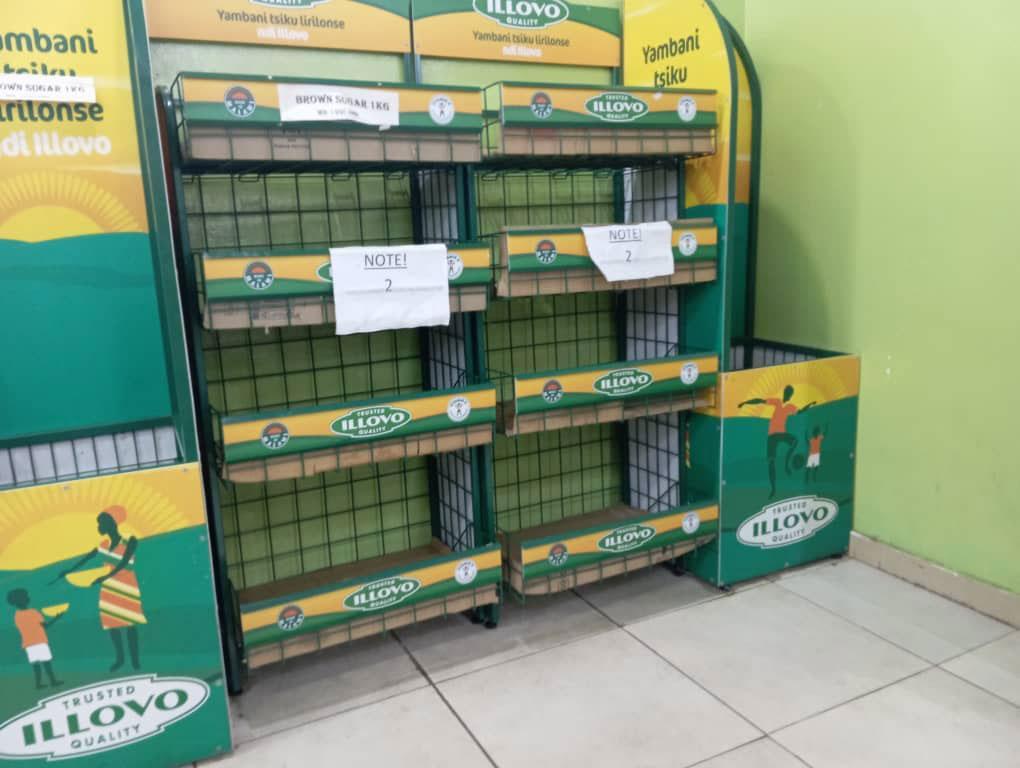Africa-Press – Malawi. THE STRUGGLE IS REAL—People queue for sugar at Ginnery Corner in BlantyreBy Isaac Salima & Samuel Kalimira:
The scarcity of sugar has worsened, forcing traders to hike the price of the commodity.
A one-kilogramme packet of the commodity is selling at around K6,000 in some locations in the country, against the recommended price of K3,000.
In Blantyre for instance, consumers have lately been struggling to buy the commodity as most of the shops have not had it in stock.
The product has been available mainly in Chipiku Stores, without other renowned outlets failing to stock the commodity, prompting consumers to queue for the commodity.
In Chilomoni Township in the commercial city, some shops were Sunday selling a one kilogramme (kg) packet of sugar at K5,700, with others pegging the price at K6,000.
When we visited Limbe, also in Blantyre, our crew found vendors selling a one kg packet at K4,500.
In Bangwe Township, which is in the commercial city, a one kg packet was fetching between K5,000 and K5,500.
The capital Lilongwe has not been spared, with a one kg packet selling at K4,500 in shops that had it in areas such as Area 23 and Likuni Township.
However, most major outlets did not have the commodity.
In Mzuzu City, most shops did not have the commodity, with vendors who had it selling a one kg packet at K5,000 or more.
The commodity that is available on the market is Illovo Sugar, with no Salima Sugar products on the local market.
Salima Sugar Company Limited Executive Chairman Wester Kossam was quoted, during the opening of the International Trade Fair in Blantyre on Thursday, as saying that they have started this year’s sugar production and that people within Blantyre, could go and buy sugar during the fair.
Angella Riwera, speaking on behalf of the Illovo Communications and Stakeholder Relations Manager, said “The current challenges in the availability of sugar are primarily being driven by two key factors. The first reason is informal cross-border trade that has led to sugar being diverted by local traders to neighbouring countries. This has created a shortage in some areas of the local market, despite Illovo having released sufficient stocks to meet domestic demand.
“The second reason is due to the delayed start of our 2025 crushing season at both Nchalo and Dwangwa estates caused by ongoing adverse weather conditions, including unexpected rains which have affected field access and slowed down harvesting operations. As a result, production is yet to reach full capacity. We expect this to improve as weather conditions stabilise and field operations normalise in the next couple of weeks,” she said.
Riwera expressed hope that things would be fine when all things are in place.
“Illovo remains committed to restoring stable supply and is working closely with all stakeholders to manage the situation,” she said.
Ministry of Trade and Industry spokesperson Patrick Botha said they would comment on the issue at an appropriate time.
Sugar scarcity has lately become a common thing despite the country having three factories that produce the commodity.
Currently, Illovo’s Dwangwa and Nchalo factories and Salima Sugar Company are the country’s sugar manufacturers.
Last year, the country faced similar challenges, with Illovo attributing the situation to the impacts of Tropical Cyclone Freddy-induced rains that affected their output.
Recently, Trade Minister Vitumbiko Mumba was confronting shop owners that were allegedly hoarding the commodity.
This year, Illovo hiked the price of sugar, with the price of a one kg packet rising from K2,600 to K3,000.
FLASHBACK—Dumped sugarcaneEarlier this month, the government-owned Salima Sugar Company Limited (SSCL) reportedly destroyed about 4,000 metric tonnes (mt) of sugarcane it harvested before halting its services.
Last month, the company stopped its operations, weeks to the start of this year’s crushing season, due to challenges with spare parts to run its plant.
However, we understand that by the time the company was stopping its plant, it had already harvested some tonnes of sugarcanes in readiness for the commencement of the sugar-making process.
Sources at the company confined in us that about 4,000mt of sugarcanes had been destroyed.
The source said the company had lost over K2 billion due to the development.
The source added that the sugarcane could have generated for the company over 40 trucks of processed sugar of 30 tonnes each.
The company sells 30 tonnes of processed sugar at about K60 million, meaning that 40 trucks are worth K2.4 billion.
“We have a problem with our boilers, whose spare parts are scarce on the market. We are also told that there is no money with which to buy the spare parts. So, we do not know which is which because others say there are some experts coming in. So, we are still waiting but the plant is not working, a development that has resulted into the destruction of sugarcanes that could no longer be used to make sugar,” the source said at the time.
For More News And Analysis About Malawi Follow Africa-Press






